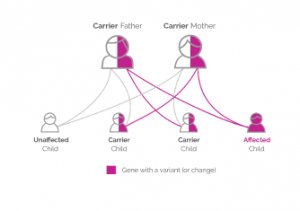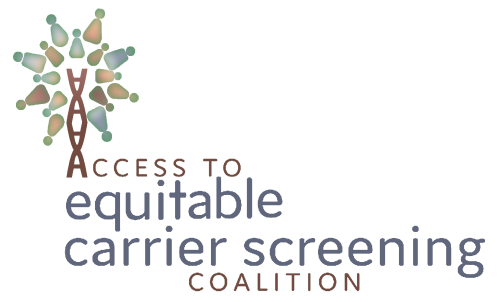


Families for ECS
Expanded carrier screening is an equitable way to help expecting parents, individuals or couples who are considering having children, identify their potential for at-risk pregnancies, and make the best decisions for themselves and their future. With recent technological advances expanded carrier screening can simultaneously test for multiple serious genetic disorders in all individuals, no matter their background. Every individual should have access to these test panels without having to pay high out-of-pocket costs. Find out more about expanded carrier screening and how you can get involved.
Add Your Voice“I’m so thankful that we had that information and that we could act on it as soon as Sonya was born”
“I truly believe that knowledge is power”
“For us there was just no question. We knew what we needed to do to have healthy children and that’s what all parents want”
Read the Kvitko family’s story here.

“Without a DNA test we’d have had no idea Lia might have Wilson’s Disease because there is zero sign of it in our families. And it can take precious years to diagnose since it shares symptoms with lots of other diseases, including depression, hepatitis, and Parkinson’s – years when the damage caused by Wilson’s is building. Much of it is irreversible, which is why an early diagnosis is so important.”
“So basically by doing genetic testing you really possibly helped the baby in case she has it? Okay, I really should get tested before we have another baby.”
Read Lia’s story here.
Every Family Deserves Access to Equitable Carrier Screening
Carrier screening provides reliable information to help with family planning.
When making family planning decisions, it is crucial to have confidence in the information you receive. That is why expanded carrier screening uses advanced sequencing technologies to provide highly accurate results that you can trust.
Expanded carrier screening helps determine whether you are at risk of passing down a genetic condition to your future children (i.e., are a carrier of a condition). Multiple analysis methods are used to provide the most accurate insight into carrier status for each gene on a carrier screening panel. This information can help your healthcare provider identify if you have the potential for an at-risk pregnancy.
Carrier screening empowers you with information for your future.
Expanded carrier screening can empower you with actionable information. If your results indicate that you are a carrier of a genetic condition, your healthcare provider may recommend that your reproductive partner be tested to determine if they are also a carrier. If you are both identified as carriers of the same condition, your healthcare provider or genetic counselor can provide information and support to help you understand your reproductive options and make important family planning decisions.
The illustration below provides an overview of the risk to your child if both you and your reproductive partner are determined to be carriers of the same autosomal recessive condition.

Carrier screening offers the opportunity to screen a broad number of genes.
Traditionally, carrier screening was only performed on a handful of genes, such as those for cystic fibrosis or spinal muscular atrophy. Thanks to technological and scientific advancements, expanded carrier screening panels today can screen for several hundred genes at once. This expanded screening enables the identification of a greater proportion of at-risk pregnancies.
Your healthcare provider will determine the right panel size for you based on your family history, ethnicity, and other factors. In the past, carrier screening panels were often selected based on an individual’s self-identified ethnicity. Expanded carrier screening offers the ability to screen pan-ethnically, thereby maximizing the information an individual can receive.
Carrier screening helps you plan for a healthier future.
Professional organizations, such as the American College of Obstetricians and Gynecologists, recommend that carrier screening be offered to all women who are pregnant or planning for pregnancy.1 Expanded carrier screening can help you understand your risk of passing on a genetic condition to your child. This information can guide your family planning decisions and also ensure you know any possible complications that can arise in your child’s lifetime.
Carrier screening is ideally performed before you or your partner get pregnant. This timing gives you the most reproductive options if you test positive as a carrier. If you or your partner are already pregnant, carrier screening is still important to help you better understand your reproductive risk and prepare for a healthier future for your family.
Advocate for Equitable Carrier Screening
News For Patients
Learn how you can help make ECS accessible
Keep up to date and find ways to help
